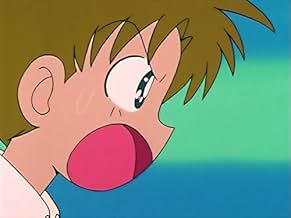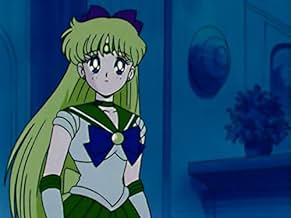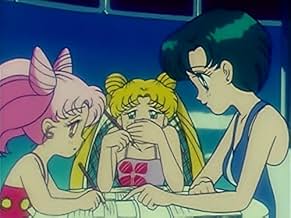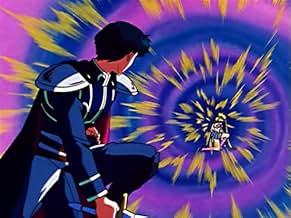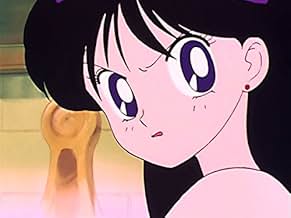Un grupo de estudiantes de instituto descubren que son las encarnaciones de poderosas princesas alienígenas y usan sus súperpoderes para proteger la Tierra.Un grupo de estudiantes de instituto descubren que son las encarnaciones de poderosas princesas alienígenas y usan sus súperpoderes para proteger la Tierra.Un grupo de estudiantes de instituto descubren que son las encarnaciones de poderosas princesas alienígenas y usan sus súperpoderes para proteger la Tierra.
- Premios
- 2 nominaciones en total
Explorar episodios
Argumento
¿Sabías que…?
- TriviaThe Sailor Senshi's civilian names relate to their superhuman roles:
- the name of Usagi Tsukino is loosely translated as "Rabbit of the Moon" ("usagi" means "rabbit", and "tsuki" means "moon").This pertains to a Japanese folktale about a rabbit that can be seen in the Moon, and also to her moon-based powers.
- Chibiusa is a loose term of "little Usagi" ("chibi" means "little" or "mini"), she being Usagi's daughter and Sailor Chibi Moon (Sailor Mini Moon in the original English dub from Cloverway).
- Ami Mizuno reads "Asian Beauty of Water" ("A" means "Asian" and "mi" means "beauty", while "mizu" means "water"), which reveals her power to control water.
- Rei Hino's surname relates to fire ("hi" means "fire"), which reveals her power to control fire. The word "rei" could be translated as "beautiful", "companion", "spirit", or "soul" (the latter fits her "Fire Soul" cry), but the name "Rei" is always written in Katakana, which suggests that it doesn't have any Japanese meaning.
- Makoto Kino translates as "Tree Spirit Makoto" ( "ki" means "tree" and "spirit"), and her power is control over nature (mostly trees/lightning).
- Minako Aino reads "Beautiful Child of Love" ("mi" means "beauty" and "ko" means child, while "ai" means "love"). This pertains to Venus being the goddess of love.
- Setsuna Meioh is loosely translated as "Moment of Pluto", which alludes to her power over time ("setsuna" means "moment", while "mei" and "o" mean "dark" and "king" and are derived from "meiosei"-"Dark King Star" which describes Pluto).
- Michiru Kaioh means "Neptune Rising" ("michiru" means "rising", while "kai" and "o" mean "sea" and "king" and are derived from "kaiosei"-"Sea King Star" which describes Neptune), which alludes to her powers coming from the ocean.
- Haruka Tenoh means "Distant Uranus" ("haruka" means "distant", while "ten" and "o" mean "sky" and "king" and are derived from "tenosei"-"Sky King Star" which describes Uranus) which alludes to her powers coming from the sky/wind.
- Hotaru Tomoe is loosely translated as "Firefly of Saturn" ("hotaru" means "firefly", while "to" means "earth" and is derived from "dosei"-"Earth Star" which describes Saturn). Fireflies are associated with spirits of the dead, which allude to her power of death/rebirth.
- ErroresIn the Hebrew dub the Senshi said "Wake up" when transforming. When the studio realised that they were supposed to say "Make up" as they do in the original Japanese they decided to keep having them say "Wake up" as they felt it went better with Hebrew.
- Citas
Sailorvenus: In the name of the moon, you're punished!
Usagi: That's my line, damn you!
- Créditos curiososIn the Hebrew dub, the extended version of "Kaze Mo, Sora Mo, Kitto!" is used in place of "Moonlight Densetsu" in the final episode.
- Versiones alternativasIn the first episodes in the Japanese language version, Mamorou calls Usagi "Dumpling Head". In the Viz Media English dub, he calls her "Bun Head".
- ConexionesAlternate-language version of Sailor Moon (1995)
- Bandas sonorasHEART MOVING
Lyrics by Yoshiaki Tsushima
Composition and arrangement by Kazuo Satô
Performed by Misae Takamatsu (Sakura Sakura)
(Columbia Records)
[Ending theme]
Opinión destacada
Bishôjo Senshi Sailormoon is my favorite Japanese Anime of all times. The only way I will watch it is in the original with English sub-titles, because I can't stand what DIC did to it. If you want to see people with pure hearts, and who do what they have to do to save the world then Sailor Moon is the anime for you.
Usagi may be everything that people (heroines) shouldn't be; a glutton, crybaby, boy chaser, who only wants to eat sweets, do things for free, and read manga but she is the purest in the group. She would give her life time and time again to protect her friends, family, and the world. The rest of the Senshi have their flaws and good points as well.
Really those who complain that it's a bad anime should watch it closer and read through the unwritten lines. There are things here that are barely seen in the real world anymore; loyalty, unconditional love, and doing the right thing for the right reason.
Try and see that even though these girls aren't perfect, they are the perfect heroines. They are very real, with human flaws. You see people like them everyday. Even though you can't see the hero in them it's there for those perceptive enough.
Usagi may be everything that people (heroines) shouldn't be; a glutton, crybaby, boy chaser, who only wants to eat sweets, do things for free, and read manga but she is the purest in the group. She would give her life time and time again to protect her friends, family, and the world. The rest of the Senshi have their flaws and good points as well.
Really those who complain that it's a bad anime should watch it closer and read through the unwritten lines. There are things here that are barely seen in the real world anymore; loyalty, unconditional love, and doing the right thing for the right reason.
Try and see that even though these girls aren't perfect, they are the perfect heroines. They are very real, with human flaws. You see people like them everyday. Even though you can't see the hero in them it's there for those perceptive enough.
- Usagi Tsukino 1781
- 10 abr 2002
- Enlace permanente
Selecciones populares
Inicia sesión para calificar y agrega a la lista de videos para obtener recomendaciones personalizadas
Detalles
Contribuir a esta página
Sugiere una edición o agrega el contenido que falta

Principales brechas de datos
What is the French language plot outline for Sailor Moon (1992)?
Responda



